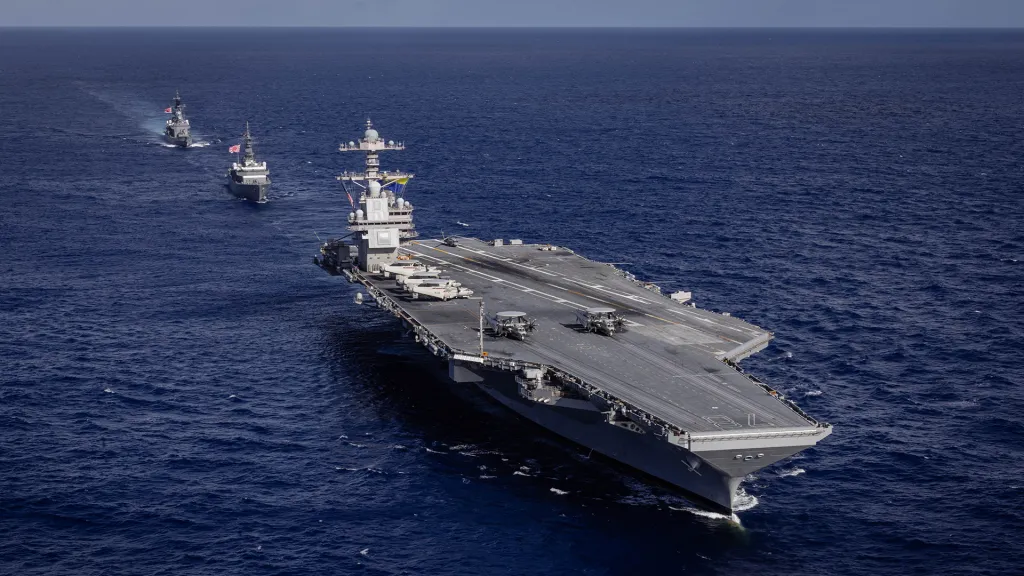Two days after passing through the Strait of Gibraltar en route to the Caribbean, the aircraft carrier USS Gerald R. Ford has not moved significantly from a position just west of Morocco in North Africa, the Navy confirmed to us Thursday. The flattop and elements of its strike group were ordered by President Donald Trump to join the ongoing enhanced counter-narcotics mission in the region, but it is unclear if plans have changed.
The relatively static position of the Ford and at least two of its escorts comes as reports are emerging that the Trump administration has decided, for now, not to carry out land strikes against Venezuela. It is unknown at the moment if there is a correlation, and the possibility remains that the carrier could still soon sail westward. We have reached out to the White House for clarification.
The Trump administration on Wednesday told Congress it is holding off for now on strikes inside Venezuela out of concern over the legal authority to do so, CNN reported on Thursday. The briefing was conducted by Secretary of State Marco Rubio, Defense Secretary Pete Hegseth and an official from the White House’s Office of Legal Counsel, the network reported, citing sources familiar with the events.
Lawmakers were told that the authority given to suspected drug boats did not apply to land strikes, the network noted. So far, nearly 70 people have been killed in at least 16 publicly known attacks on vessels allegedly smuggling drugs in the Caribbean and Pacific. The most recent acknowledged strike took place on Tuesday. The strikes have garnered heavy criticism for being extrajudicial and carried out without Congressional authorization.
Asked if the administration is indeed opting against land attacks on Venezuela, at least for now, the White House gave us the following response:
“President Trump was elected with a resounding mandate to take on the cartels and stop the scourge of narcoterrorism from killing Americans,” a White House official told us. “The President continues to take actions consistent with his responsibility to protect Americans and pursuant to his constitutional authority. All actions comply fully with the law of armed conflict.”
CNN’s reporting came after a Wall Street Journal story on Wednesday stating that President Donald Trump “recently expressed reservations to top aides about launching military action to oust Venezuelan President Nicolás Maduro.”
Trump feared that strikes might not force Maduro to step down, the newspaper noted. Though ostensibly begun as an effort to stem the flow of drugs, it has grown into a massive show of military force aimed partially at Maduro.
The administration is considering three main options for dealing with Maduro, The New York Times reported earlier this week. They include stepping up economic pressure on Venezuela, supporting that nation’s opposition while boosting the U.S. military presence to add pressure on the Venezuelan leader, and initiating airstrikes or covert operations aimed at government and military facilities and personnel.
However, the goal is in flux, administration officials acknowledge, according to the Journal. Meanwhile, Trump has also delivered mixed messages, saying he doubts there will be an attack but that Maduro must go.
What is clear is that there is a massive U.S. military presence in the Caribbean, which includes at least eight surface warships, a special operations mothership, a nuclear-powered fast attack submarine, F-35B stealth fighters, AC-130 gunships, airlifters, MQ-9 Reaper drones and more than 10,000 troops.
The Ford was supposed to join that force, but if the administration is content for now to hit boats suspected of carrying drugs, it might not make sense to move the carrier and escort ships more than 3,600 miles west, especially as there is high demand elsewhere for American naval presence, including in Europe, where the supercarrier just came from.
The issue of wear and tear on the force is something that the Pentagon will have to evaluate as it decides which assets to keep and which to pull from the Caribbean. Navy vessels began arriving in the region in late August and at some point, they will need relief. That could mean bringing in ships, possibly from other regions. The same can be said for aircraft units and personnel deployed around the region for the operation. Those forces can only remain spun-up for so long, or the operation needs to be adapted for a long-term enhanced presence. This could very well be underway already, although we have not confirmed this as being the case. However, being so close to the U.S. mainland reduces some of those concerns, especially for rotating units in and out.
Regardless of Trump’s intentions, the U.S. military presence continues to endure in the region. Thursday afternoon, two more B-52H strategic bombers flew near the coast of Venezuela, according to online flight trackers. These bomber flights have become something of a routine at this point. In addition, the San Antonio class amphibious transport dock ship USS Fort Lauderdale is once again back in the Caribbean after a pitstop in Florida for routine maintenance.
At 5 p.m., the U.S. Senate is scheduled to hold a floor vote on a bipartisan war powers resolution that would block the use of the U.S. Armed Forces to engage in hostilities within or against Venezuela, unless that action has been authorized by Congress. A similar measure failed several weeks ago and it remains to be seen if news that the administration is holding off on striking Venezuela will move the needle on that resolution.
Meanwhile, we will continue to monitor the progress of the Ford and the U.S. military presence arrayed against Maduro and provide updates when warranted.
Update: 6:07 PM Eastern –
The Senate bipartisan war powers resolution was voted down by a vote of 51 to 49.
Contact the author: howard@theewarzone.com
